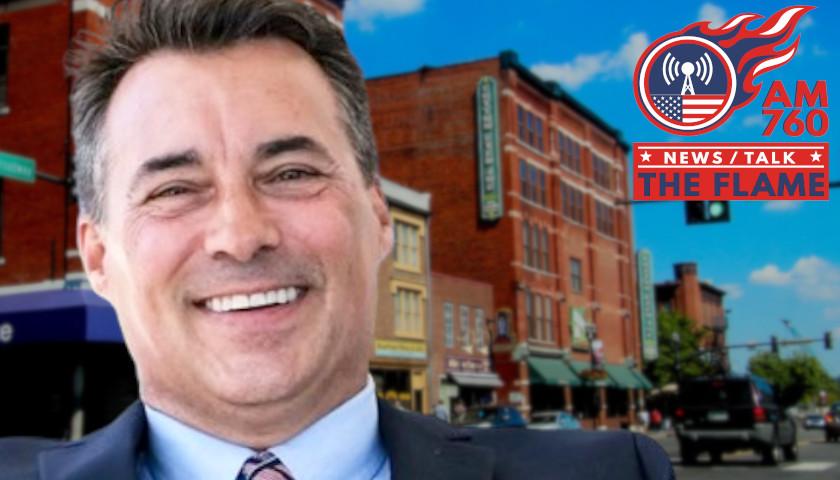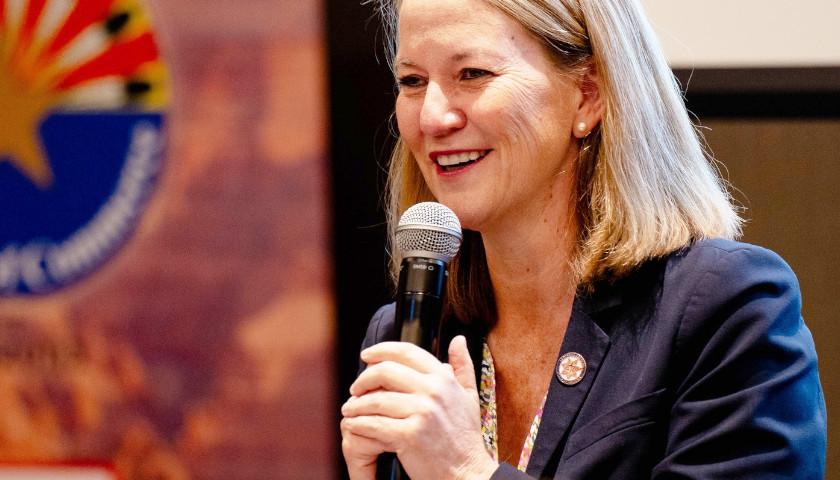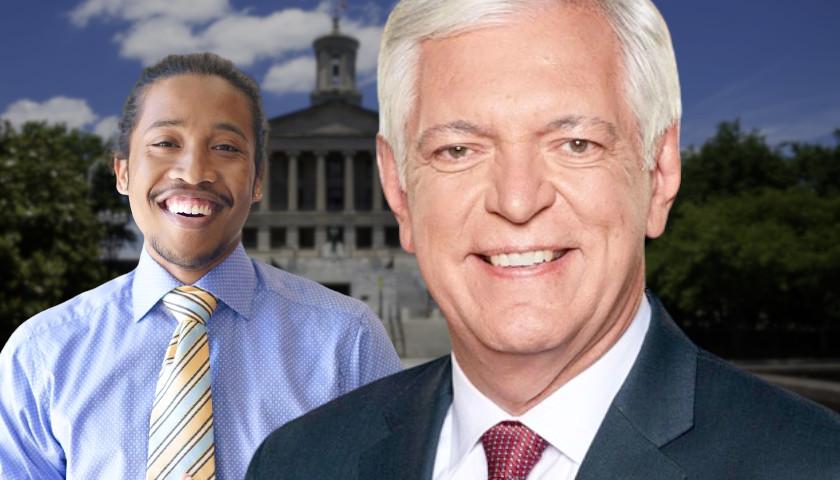Metro Nashville Council Member Jeff Eslick joined The Tennessee Star Report with Michael Patrick Leahy on Thursday to detail his discoveries into the precipitous drop in law enforcement and its effect on the state of public safety downtown on the heels of the city announcing the Hermitage homeless encampment will be taken down in January.
TRANSCRIPT
Michael Patrick Leahy: 12:34 p.m.; broadcasting live from our studios in downtown Nashville, just a quarter mile from the state Capitol, actually about the same distance from Metro headquarters to the mayor’s office.
Jeff Eslick: I’ll be stopping by today.
Michael Patrick Leahy: Well, tell the mayor we said hello.
Jeff Eslick: I will.
You know, we had a great conversation and some genuinely good rapport after the tornado. It was good. It felt good.
Michael Patrick Leahy: We look forward to having Mayor O’Connell here in the studio. That’ll be lively. I think he’ll love the digs.
Jeff Eslick: Delightful.
Michael Patrick Leahy: The digs are cool.
Jeff Eslick: They are.
Michael Patrick Leahy: So Jeff, you have some updates for us on a couple of things you’ve been working on.
What’s the status of the Hermitage homeless encampment?
Jeff Eslick: Yeah, and it’s not actually in my district. It was before the redraw. But it affects my district, for sure. You have to, in one way, you pretty much have to go by it.
I mean, you could go down Lebanon Road instead, but the common feeling is just go up Andrew Jackson and come through.
But it was announced on Friday that they will be closing that encampment in January. They’ve let the people in the encampment know – I think they were out passing out flyers or whatever it is that they give them paper-wise or notification-wise.
And I’m speculating here, but I believe they’re going to be the first people to go into Nashville’s new transitional housing place.
We were told in orientation. I think it’s at 600 2nd Avenue North – somewhere right around there – that it would be open in the first quarter. And then I heard that it would be open in January, so I’m guessing this is going to be the place where they put them.
It should be fabulous – it’s brand new. It has a clinic on-site. It has washers and dryers on-site. They will be able to have a lot of things you can’t have while you’re in the woods, right here when it comes to being cold. So I’m excited for them. I hope this does work out and they find housing, which turns into a better way of life and then maybe a great job and you know, even a better outcome past that.
Michael Patrick Leahy: So that was, I think, one of the things that Mayor Freddie O’Connell was talking about when he was running. And now that he’s mayor the past couple months, would you say he’s made progress on the homeless front, or?
Jeff Eslick: I don’t know that he’s done much more than what was already in place.
Not that he may have been doing a lot – I do not know. But I know April Calvin and the Office of Homeless Services has been working on this encampment for a while. And I’m sure that he is encouraged and kept up with everything that was going on before. I don’t know what his directive may have been – more or less even?
Michael Patrick Leahy: Well, we’ll just put this out that one of the – and when the Mayor O’Connell comes in here, we’ll talk to him about this – one of my concerns is if you make it easier to be homeless and national, you will become a magnet.
But we can’t talk about that. That’s a full hour – a full day – of conversation, but I want to talk about some of the other things.
You’ve discovered something.
Jeff Eslick: Yeah, I work with businesses on Broadway. And I’ve been around Broadway not just as a regular citizen who, you know, uses it or goes by and enjoys the music or whatever; but actually through my business world, I’m exposed to Broadway more than a lot of people.
Michael Patrick Leahy: You know the business is down in Broadway?
Jeff Eslick: Right. I know a lot of the business owners.
Michael Patrick Leahy: As well as anybody on the city council. Perhaps better than anybody else.
Jeff Eslick: It was evident during the Veterans Day parade when we went down Lower Broadway, and everybody was screaming my name; it was fantastic. Fantastic.
Michael Patrick Leahy: ‘Hey Jeff!’
But one thing that I’ve noticed for a long time: it’s the same people that are panhandling down there.
They were there 11 years ago when I started my own company, probably before that, but I didn’t really notice them until I started my own company and was working down there more frequently.
And, so I pulled some research and found 12 names. I know there are more than that, but I just found 12 names of people that are repeatedly arrested for violations on or around Broadway.
Michael Patrick Leahy: For panhandling.
Jeff Eslick: For indecent exposure, public drunk, blocking sidewalks, resisting arrest, assaulting a nurse or a first responder, drug possession, drug paraphernalia – there’s about 10 different things that they seem to circle around.
You get arrested, you may get three of those, each time.
Michael Patrick Leahy: So people that have studied crime notice that it’s a very small group of people that are repeat offenders. And if you are able to address that small group of people, you can really lower the crime rate.
I think that’s kind of what you’ve stumbled upon here with these panhandlers down on Broadway.
Jeff Eslick: Well, some of them have been arrested eight to 13 times already in 2023.
Most of the charges that I just threw out there carry a 30-day sentence.
So how can you be arrested 13 times and get a 30-day sentence each time? You can’t, not in a year.
So what I’m finding is they’re basically “time served.”
They get arrested one day, the next morning when the prosecutor comes through, they get “time served” and they’re out.
Some of it derives from the mental incompetence, which is what we saw with the guy that shot the Belmont Student and that he had been deemed mentally incompetent to stand trial or to understand the punishment, and so every time he’s arrested, he’s released. And that’s what’s happening. That’s the same thing.
So my question was, if the police aren’t going to do this, then is it up to the business owner, the security guy at the business, or even the tourist to protect themselves?
Michael Patrick Leahy: That’s not a good look.
Jeff Eslick: Terrible look for a city that’s based on tourism.
Michael Patrick Leahy: Really bad. But let’s get back to that a little bit.
So, these 12 repeat offenders are brought up on charges, they come before a judge and a District Attorney Funk.
Jeff Eslick: Or somebody in his office.
Michael Patrick Leahy: Somebody in his office.
Jeff Eslick: He doesn’t do everything.
Michael Patrick Leahy: It’s an assistant district attorney. They come up, and why don’t they say ‘This person needs to be on this charge, we need to put them away for 30 days.’ Why doesn’t that happen?
Jeff Eslick: I want to know the answer, too.
Michael Patrick Leahy: Are you going to ask?
Jeff Eslick: I’m working on that, and I’ve also uncovered some research that I’m still delving into.
I want to make sure whenever I ask these questions that, I have enough of a background of it where I just don’t ask one question to get frustrated if they give me a sideways answer or something.
But in the City of Nashville, in the last few years, we are down 50 percent in traffic stops.
So: speeding, no blinker, whatever – 50 percent.
I’m sure we have more cars because we have more people. And since we have more people, you would think that we have more arrests. But we are also down.
We were, in about 2019, we were at 100 people a day being arrested. Now we’re down to 50 per day. So we are down 50 percent on arrests and we are also down 50 percent on traffic violations.
Add that to the people that aren’t being prosecuted on Broadway, and I think you can see a clear path to something’s going on.
I don’t believe our police officers are doing this intentionally. I’m sure this has got to be coming from somewhere else. So, whether it’s the oversight board, the police chief, the mayor – and again, I think this would have been Cooper, because most of this data is underneath Cooper.
O’Connell got in when I got in, so he’s two and a half months in. I’m not laying any of this on Freddie.
Michael Patrick Leahy: But to me though, I think there are two failures here in cleaning up Broadway on these 12 repeat offenders who like, repeat forever. And would you agree with me that if we got those top 12 offenders out Broadway would be a lot better?
Jeff Eslick: Yeah; but there are more than 12. Let me throw that out there. These are just the ones that I figured out in about one week, two weeks.
I would say there’s probably double that number – it would be easy to find. And our police officers – again, even on Broadway – our police officers aren’t arresting people on Broadway, either.
A lot of these arrests are coming from the state troopers, which are working for a private security firm that’s hired by the downtown partnership to protect Broadway.
Michael Patrick Leahy: Why aren’t the Metro Nashville Police police arresting offenders?
Jeff Eslick: Same answer as before: somebody’s told them don’t do it.
Michael Patrick Leahy: Somebody’s told them don’t do it.
Jeff Eslick: I believe that.
Michael Patrick Leahy: How would we find out?
Jeff Eslick: I’m gonna work on it, and have me back.
Michael Patrick Leahy: It seems to be that the problem is it so once they’re arrested, and they go before the judge, the assistant district attorney should be asking them, should be asking for prosecution to the full extent of the law.
Number one, they’re apparently not doing that. Number two, the judges should actually enforce the law.
I think, broadly speaking, that the district attorney is too soft on crime. Number one. District Attorney Funk. And then the judges in Nashville are too soft on crime. And now, but what you’re telling me, somebody in Metro Nashville Police Department is telling–
Jeff Eslick: Or it could have been Cooper. I don’t know.
Michael Patrick Leahy: Somebody.
Jeff Eslick: Somewhere somebody discouraged – I would say that, that word might fit – discouraged them from pulling people over for traffic violations, arresting people, and prosecuting people.
See, in Jacksonville, they have the multiple misdemeanor offender program, which after a certain number, something else triggers, and it happens. We don’t have that, and we need to look into that.
I know it may get to where you label somebody with something but facts.
If you did this ten times, there is no label. It’s a fact, at this.
Thirteen times in one year? That’s a fact.
So those things need to be put into play to make sure that we can protect the golden goose – because my district if we lose all this tourism money, my district is going to have to increase taxes to pay for the same amount of services that we got before.
Nobody wants to do that.
That’s like buying a brand-new air conditioning unit for your house. You spend a ton of money doing it. But what did you get? The same that you had before. Nobody goes out and says, ‘It’s a beautiful air conditioning unit – go look at it.’
Now, you had to pay a ton of money and have a lot of work and you’re just back where you were before.
So the same thing would be there. If we lose tourism money, we’re going to have to increase our taxes to have the same services we enjoy now with the benefit of the tourists paying that.
Michael Patrick Leahy: Is there any indication that tourism is up, down, or the same?
Jeff Eslick: I’ve looked at some of the hotels. It’s basically flat over last year. Now that that was in the hotel rental area. It may be up or down slightly, but I didn’t see anywhere for at least – and again I’ve only been getting these for about three months – but they seem to be very flat if not slightly down.
Michael Patrick Leahy: So you are our ambassador to Metro Council, right? Our listeners can hear you talk about what’s really going on in Metro Council. And you’re going to be here with us every other Thursday at noon.
I think next time we’ll make a little lunch for you here.
Jeff Eslick: And if I’m going to be an ambassador, I’m probably going to wear ambassador clothing.
Michael Patrick Leahy: That’s good.
Jeff Eslick: Does that come with a pen?
Michael Patrick Leahy: The other thing as an ambassador, so you need to reach out to those people that we have questions and invite them to come in here in a friendly environment.
Jeff Eslick: Well, and also if anybody wants to keep up with what I’m doing, jeff.easlick@nashville. gov is my newsletter email address.
Michael Patrick Leahy: “jeff.eslick@nashville. gov”
Jeff Eslick: That’s it.
Michael Patrick Leahy: Jeff Elick, thanks so much for joining us.
Jeff Eslick: Thank you
When we come back folks, it’ll be time for News Potpourri.
You’re listening to The Tennessee Star Report.
I’m Michael Patrick Leahy.
We’ll be right back after this.
– – –
Listen to The Tennessee Star Report with Michael Patrick Leahy weekdays from 11:00 am to 1:00 pm on WENO AM760 The Flame.
Photo “Jeff Eslick” by Jeff Eslick.




